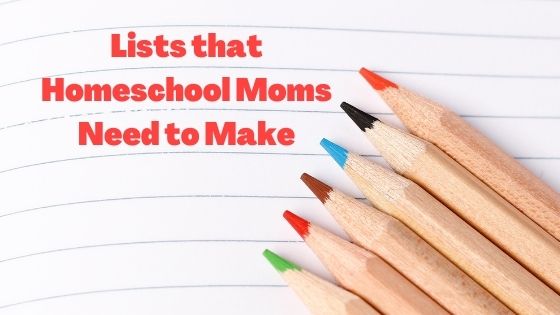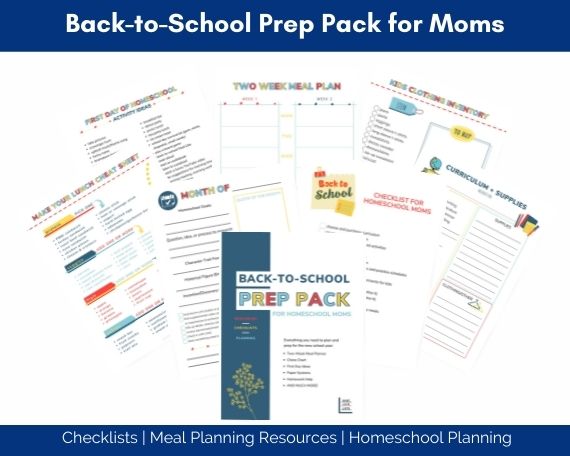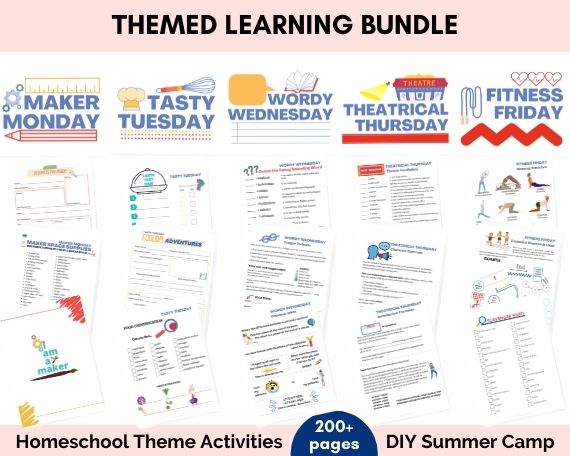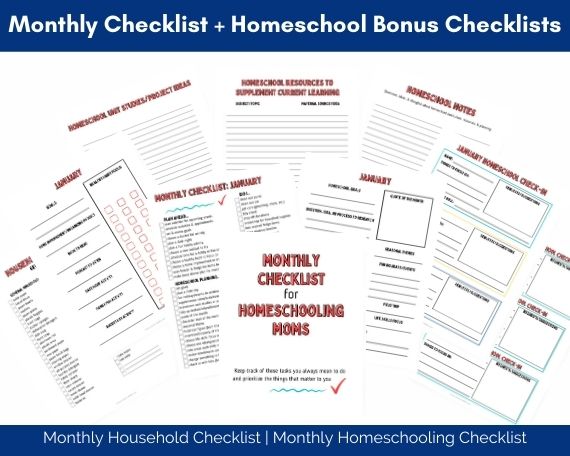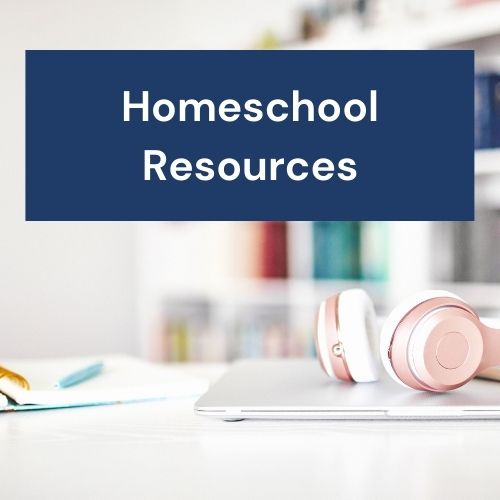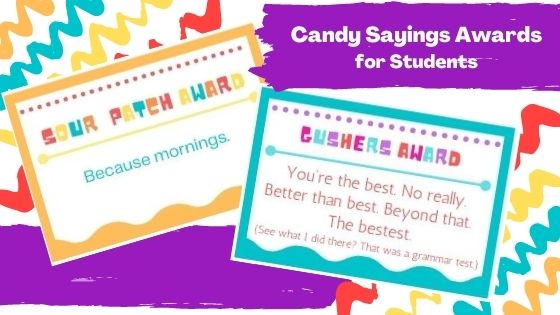Lists Every Homeschool Mom Needs
As a homeschooling mom, I know you’ve got a lot on your mind. Lists are essential for keeping track of all the things to do, buy, and remember. The nine lists I’m suggesting here aren’t to-do lists to check off and discard. These lists provide a place to record ideas you’ll want to reference again and again.


Here are nine lists homeschool moms should make to organize priorities, track ideas to supplement your curriculum, and provide inspiration when you’re out of ideas.
Get my printable list pack ready to fill in with your own lists

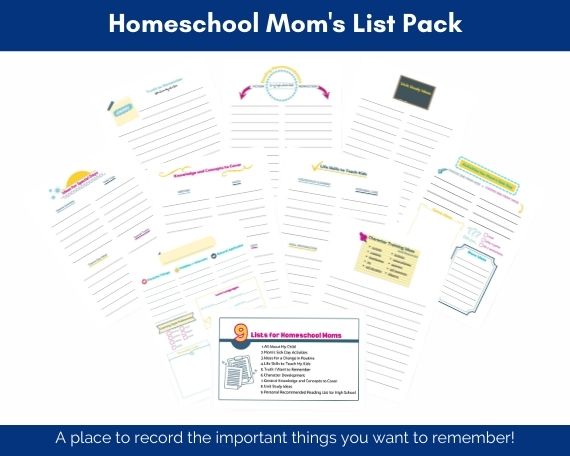
1 // All About My Kids
As moms, we generally believe we know our kids well. You may have a good idea of what they like and don’t like, their strengths and weaknesses, and probably a general idea of how they learn best.
Keeping a list of ways your kids learn, what motivates them, and how they respond to the world will help you parent and teach more effectively.
Your list will change as your kids grow and change, but you’ll have a reference point to help you interact with them in ways that communicate constructively.
Suggestions for All About My Child List
- favorite things (foods, colors, authors, etc.)
- hobbies and interests
- natural aptitudes
- learning styles
- love languages
- personality traits
- strengths and weaknesses
- ability to handle sensory stimulation (visual, auditory, tactile, etc.)
- things that trigger emotional outbursts
- pet peeves
- disciplinary tools that work well or don’t work
I’m giving you a free “All About My Child” template to keep track of these things for your kids! Join my mailing list (just enter your email at the end of this article) and you’ll get access to my printables library, where you’ll find this freebie along with hundreds more helpful pages.
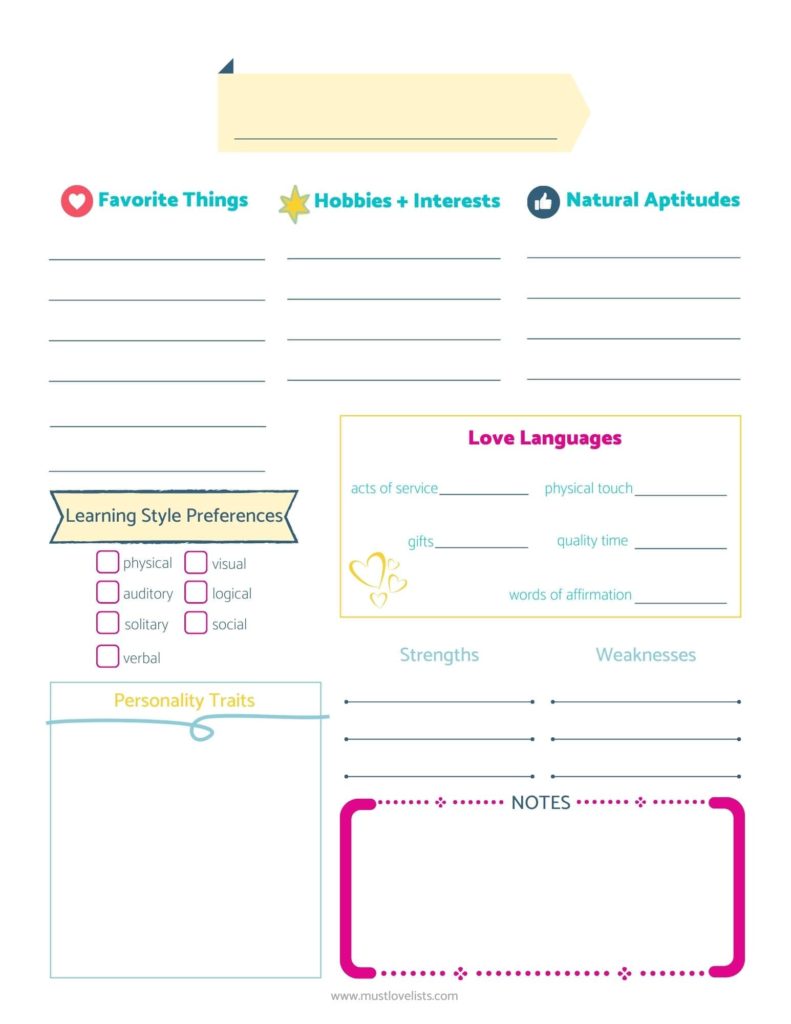
Read: Student Collage Assignment for a fun get to know yourself project

2 // Homeschool Activities for Mom’s Sick Days
Plan ahead for those days you’re unable to be much help to your kids and keep a list of activities to use when you need a sick day. Add activities your kids can do to stay occupied (and even learn) when they get stuck on an assignment, or don’t know what to do without you.
Suggestions for Activities When Mom is Sick
- board games (Boggle, Pictionary, Scrambled States of America, Quixx, Memory, etc.)
- puzzles
- crossword puzzles, word search, Sudoku, or other paper games
- workbook pages for review or just fun learning
- art (coloring, drawing tutorials, creative lettering books)
- reading (have older kids read to younger, keep a special bin of books for sick days)
- watch documentaries (keep a list of titles or add a Netflix profile with a watchlist just for school/educational purposes)
- make something with a box (keep a few empty boxes for your kids to use…boxes just seem to spark their creativity)
- new toy (keep a few small LEGO builds or easy craft projects tucked away to pull out on a sick day)
For slightly older kids who are able to mostly manage themselves but normally work with you to complete certain lessons, create a “substitute plan.” Make a printable page with a list of activities for them to choose from while you rest. They get to play teacher and assign themselves any of the allowed activities.
You can also create a PDF file with clickable links to specific video content and educational online games for your kids to use when you are sick. If you’re using Google classroom other digital platform, you can upload the file there. You could email the file to them as an attachment, or save it on the desktop of their computer or Chromebook for them to easily access.
Read: 36 Documentaries to Use in Your Homeschool

3 // Activities for a Change in Regular Routine
Regardless of what curriculum you’re using or how old your kids are, you will likely come to a point during the school year when you feel the need to break out of your regular routine. Your kids need an occasional change of pace; something to break up the normal schedule. Keep a list of activities to add a dose of fun and break out of a homeschool rut.
Suggestions to Try for a Change in Homeschool Routine
- try a themed day or week (check out my post with fun homeschool theme day ideas)
- have a game day
- go on a field trip
- have a dance party
- take a walk
- go out for a treat (smoothie, donut, muffin, nachos, etc.)
- have a picnic outside
- do art all day (paint on canvasses, make a mural with a giant roll of paper, make jewelry, etc.)
- make an obstacle course
- have a baking day
- take school on the road (go to the library, outside, a coffee shop, even Grandma’s house)
- have a read-aloud day
- give them a pajama day
Read How to Plan a Homeschool Day with Fun Theme Ideas
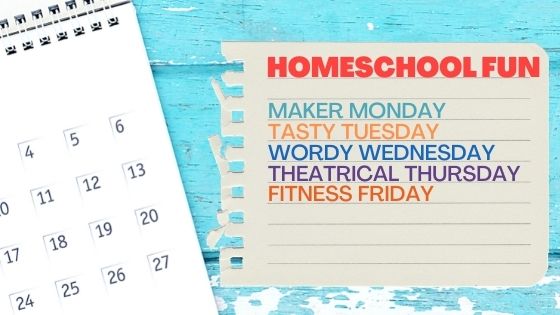
4 //Life Skills to Teach My Kids
An 18th birthday can seem a long way off in the early years. But once they get to be teenagers and we realize how much they still need to learn before we let them loose on the world, the time feels almost impossibly compressed.
Make a list of life skills you want your kids to possess before they venture out into the world on their own. Yes, they’ll still be able to call you, and it’ll be nice to be needed, but ultimately, you want your kids to be prepared to handle most of daily life on their own.
Suggestions to Consider for Life Skills List
- cleaning tasks (dishes, bathrooms, kitchen, living areas)
- laundry (reading clothes labels, washing clothes, towels, sheets, etc., cleaning washing machine, cleaning dryer lint filter)
- home maintenance (changing lightbulbs, smoke detectors, turning off power and water, locating circuit breakers, unclogging a toilet, etc.)
- car maintenance (checking oil, tire pressure, charging battery, pumping gas, etc.)
- personal hygiene and health (flossing teeth, trimming nails, hair care, cleanliness, washing hands, importance of exercise, nutrition, etc.)
- meal preparation (meal planning, grocery shopping, making breakfast food, packing a lunch, making dinner)
- public etiquette (ordering at a restaurant, attending a dinner party, phone etiquette, etc.)
- managing finances (opening bank accounts, applying for a loan or credit card, budgeting, investing)
- shopping (comparing prices at multiple stores, comparing price per ounce/pound/unit, noting best times to purchase certain items)
- emergency preparedness (what to keep on hand for emergencies, first aid, memorizing important numbers, knowing where exits are located, etc.)
- traveling (how to use public transportation, how to read a map, highway systems, etc.)
- study skills (how to read for comprehension, quizzing themselves for retention, teaching to someone else, etc.)
- workplace skills (typing, applying for a job, creating a resume, conversation skills, decision making, problem solving, awareness of the impact of their actions on others)
- general skills (making appointments, returning items to a store, requesting customer service assistance)
Read: 140 Essential Life Skills to Prepare Your Teen for Adulthood
5 // Truth I Want to Remember
So many days fly by in a blur of housework, schoolwork, job work, and frequent interruptions. On the days I wonder whether I really want to homeschool at all, or on days when everyone is grumpy, it’s helpful to have a list of truth reminders.
Suggestions to Include on Your Truth Reminders List
- reasons I want to homeschool
- positive things my kids have said about homeschooling
- encouraging words from other homeschooling moms (from books, blogs, or personal conversations)
- activities that help me relax
- ways I’ve seen homeschooling impact our family positively
- homeschool priorities
- things I don’t have to do just because other people do them
6 // Character Development to Work on with My Kids
Most of us want to raise our kids to be kind, hard-working, creative members of society. Making a list of positive character traits is a great way to keep those character building ideals at the forefront of your mind.
Add notes detailing useful resources for these character development ideas and you have a reference list you’ll want to keep handy as you plan each school year.
Suggestions for Character Building Ideas
- curiosity
- creativity
- thankfulness
- joy
- self-discipline
- kindness
- resourcefulness
- optimism
- self-awareness
- diligence
Click on any of the character traits listed above to go to my Character Counts series with resources to use in teaching character, including book and movie suggestions, quotes with discussion questions, activities, scripture, and more.
Read 18 Character Traits to Model for Your Kids
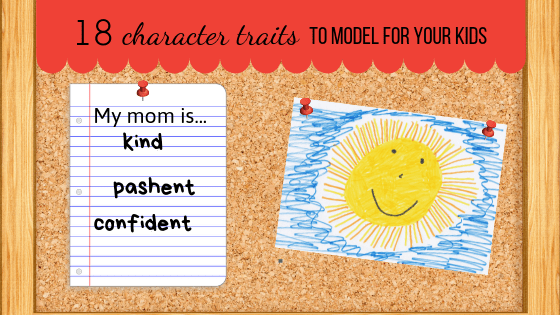
7 // General Knowledge and Concepts to Cover
Homeschooling opens up a world of possibility. Your kids want to dive deep into atoms, art, or Abraham Lincoln? Sure! Let’s do it! But I also want to make sure my kids get an overview of subjects that will provide them with basic knowledge about variety of topics. And there are certain skills and concepts we need to cover if they plan to pursue a traditional college path.
Your list can be adjusted year by year, but it’s helpful to have an overview of what you want to accomplish as you plan each year’s curriculum.
Suggestions for General Knowledge to Cover
- typing
- technology (spreadsheets, word processing, presentation software, coding, graphic design)
- science (basic biology, periodic table, laws of physics, how to conduct an experiment)
- geography (identify continents and major oceans, general knowledge of major countries of the world, major mountain ranges and rivers)
- history (familiarity with well-known historical figures, major wars and the reasons they happened, general knowledge of U.S. history and government)
- math (ability to perform basic addition, subtraction, multiplication, and division, understanding of metric system, measurements, basic geometry, basic Algebra)
- reading (selection of classic literature, familiarity with types of poetry, famous works of Shakespeare, Bible, biographies of historical figures)
- writing (ability to communicate effectively through email, informative essays, bibliographic citations)
- music (familiarity with famous classical works and popular music, musicians who deeply impacted culture)
- art (able to identify various genres of art, knowledge of famous works of art and artists)
- ability to argue persuasively in support of a particular position
- able to deliver an effective and engaging oral presentation
8 // Unit Study Ideas
We can’t possibly teach everything to our kids. The amount of curriculum and information available is so vast it feels almost infinite. I find it helpful to keep a list of unit study ideas as they come to me. Some kids have a deep interest in a particular subject, but other times they don’t really know what they might be interested in without being exposed to it. A list of unit study or topical study ideas can provide them with options to choose from and spark an interest in something new.
This list will grow as you continue to add ideas year after year. You can list topics, books, people, anything at all that might be interesting to you and your kids.
Suggestions for Unit Studies
The possibilities are almost endless here. This is a short list to help you start thinking about a variety of ideas.
- volcanoes
- female inventors
- Leonardo da Vinci
- history of newspapers
- ancient Egypt
- butterflies
- solar system
- Charlotte’s Web
- horses
- human nervous system
- breakfast around the world
- tornadoes
- baking Christmas cookies
- preparing for a camping trip
Read National Park Project for Kids for an engaging research project idea

9 // High School Recommended Reading List
As an avid reader, when I read a book that has a significant impact on me, I want to recommend it to my kids when they are older. There are many standard reading lists available for high school students, but this list is for your personal recommendations. They may or may not read them, but at least you will have a list of personal recommendations as a starting point.
More lists and activities to organize your homeschool

Lists for Homeschool Moms to Organize Ideas
There are so many bits of information homeschooling moms want to remember. These lists for homeschool moms can help keep some of that information organized and accessible.
- All About My Kids: list of personality traits, strengths and weaknesses, likes and dislikes
- activities for when mom is sick
- ideas to change up the regular routine
- life skills to teach before they leave home
- truth reminders for tough days
- character building ideas
- general knowledge and concepts to cover
- unit study ideas
- personal recommended reading list for high school and beyond
Take a few minutes to start these lists and you’ll have a specific place to jot down all those bits of information each time you think of something to add. Keep your lists in a 3-ring binder to organize them and give yourself a go-to spot to reference all your homeschool planning information.
Visit my homeschool resources page for monthly unit study ideas, projects, and homeschool planning help!


